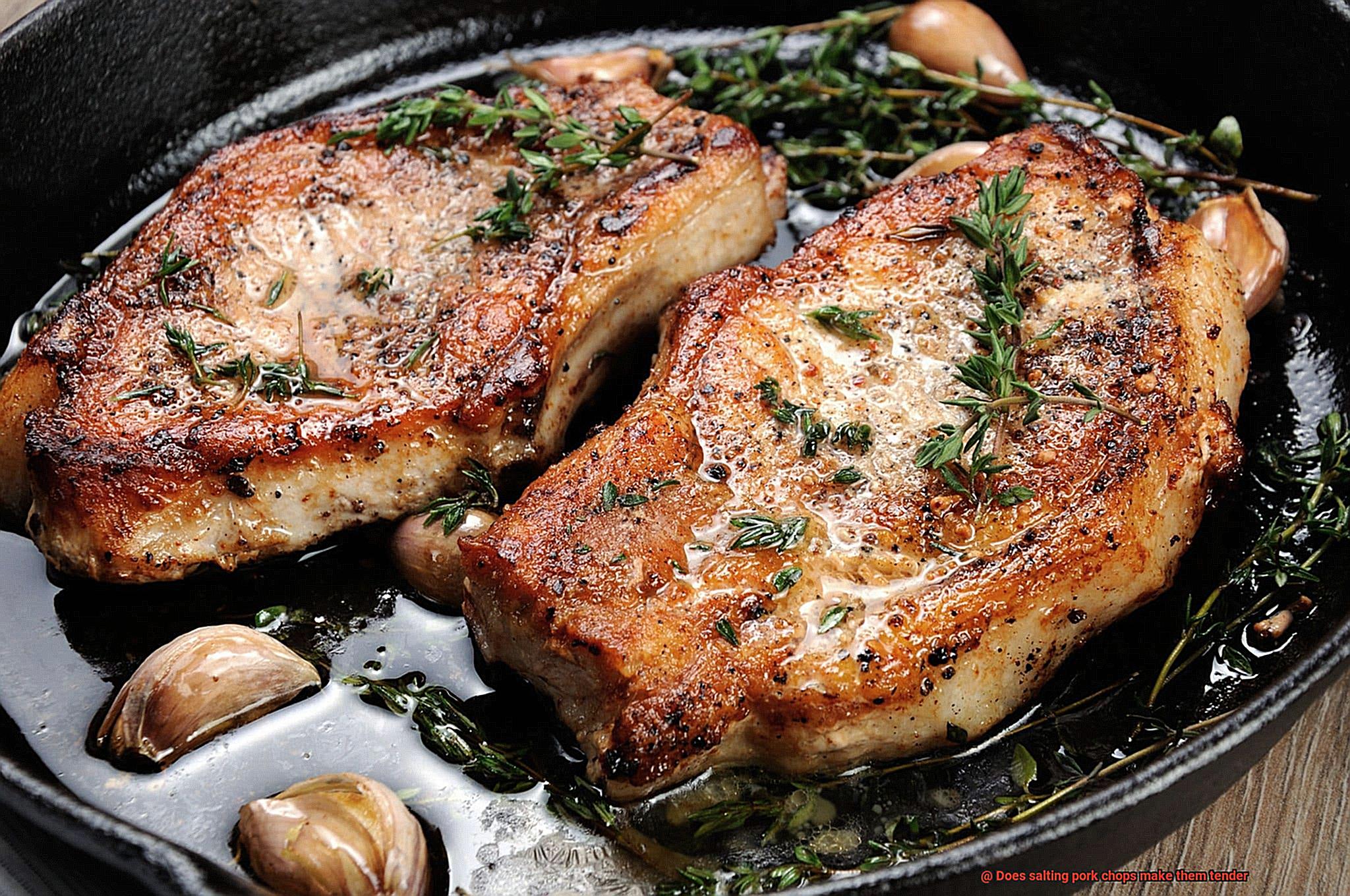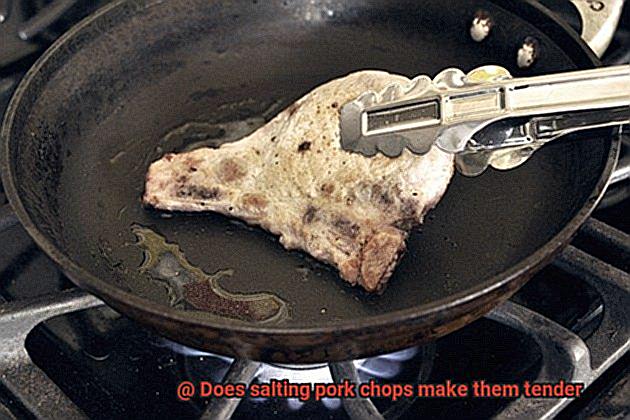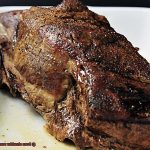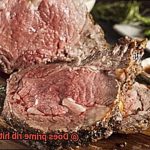Do you dread the thought of tough and chewy pork chops ruining your dinner plans? If you’re looking for a solution, you might have considered salting your pork chops to make them more tender. It’s a common practice in many recipes, but does it really work? The answer is a resounding yes. In fact, salting can be an effective way to enhance the flavor and texture of your pork chops.
So, how does it work? Salt is a natural tenderizer that breaks down the proteins in meat, making it more succulent and juicy. When salt is applied to the surface of the meat, it draws out moisture, which then reabsorbs into the meat along with the salt. This process is called osmosis and not only flavors the pork chop but also helps to break down its fibers, making it softer.
But that’s not all – salting your pork chops in advance can also help to retain moisture during cooking. This is because salt helps the cells in the meat to hold onto water, preventing it from drying out as it cooks. As a result, you’ll end up with a perfectly cooked pork chop that’s both flavorful and tender.
However, there’s a catch: there’s a science to salting meat before cooking. Too much salt can make the meat too salty or even cause it to become mushy if left for too long. So if you want to achieve that perfect balance of tenderness and flavor, follow these steps:
- Generously sprinkle kosher or sea salt on both sides of your pork chop.
- Let it sit at room temperature for 30 minutes before cooking.
- Rinse off any excess salt before patting dry with paper towels.
- Cook as desired.
Now that you know how salting works its magic on pork chops, give it a try yourself. With this simple technique under your belt, you’ll be able to enjoy perfectly tender and delicious pork chops every time.
Contents
The Science Behind Salt’s Tenderizing Effect
Let’s dive into the science behind salt’s tenderizing effect on pork chops.
Meat is made up of long strands of protein fibers that are held together by connective tissues. When these fibers are cooked, they tighten up and can become tough and chewy. Salt disrupts these fibers by drawing out moisture through a process called osmosis. This causes the fibers to break down and become more tender. The salt also helps enzymes in the meat break down proteins, further contributing to the tenderizing effect.
The amount of time that the meat is salted can impact the level of tenderness achieved. Longer salting times lead to more tender meat, but over-salting can result in an overly salty taste. Finding the right balance is key.
It’s worth noting that while salt can be an effective tenderizer for certain cuts of meat, it may not have as much of an impact on others. Cuts with high levels of connective tissue may require longer cooking times or other methods of tenderization beyond just salt.
Along with using salt, proper cooking techniques play a crucial role in achieving tender pork chops. Low and slow cooking methods such as grilling or roasting are best, as high heat can cause the meat to tighten up and become tough. And letting the cooked pork chops rest for a few minutes before slicing retains their juices and enhances their tenderness.
How to Properly Salt Pork Chops
The key to achieving succulent and flavorful meat lies in properly salting your pork chops. But how do you do it correctly? Here are five essential tips for properly salting pork chops:
Use the right salt
Kosher salt is the preferred choice because of its larger grain size, which makes it easier to sprinkle evenly over the meat’s surface. This ensures that the salt is distributed uniformly, avoiding clumps in certain areas.
Pat dry before salting
Before salting, pat the pork chops dry with paper towels. It removes excess moisture from the surface of the meat, ensuring that the salt sticks evenly.
Don’t overdo it
Aim for about 1/2 teaspoon of kosher salt per side of a 1-inch thick pork chop. Adding too much salt can make the meat tough and dry.
Let it rest
After salting, let the pork chops rest at room temperature for at least 30-60 minutes before cooking. This gives the salt time to penetrate the meat and draw out its natural juices, resulting in a more tender and flavorful chop.
Wipe off excess salt
Before cooking, wipe off any excess salt or brine from the pork chops. This prevents them from being too salty and ensures even cooking.
Benefits of Salting Pork Chops
Look no further than the simple but mighty technique of salting. As an expert in this area, I can attest to the numerous benefits of salting your pork chops before cooking.
Firstly, salting is an effective way to break down the tough muscle fibers in pork chops, resulting in a more tender and succulent texture. This is achieved by drawing out moisture from the meat and creating a brine that helps to break down the proteins in the muscle fibers. With salting, you can say goodbye to chewy and dry pork chops, and hello to juicy perfection.
But that’s not all. Salting also enhances the natural flavors of the meat and balances out any bitterness or gaminess that may be present in some cuts of pork. It’s like adding a secret ingredient that takes your dish to the next level. Plus, with proper seasoning, you can customize your salt level to your own preferences.
In addition to improving texture and flavor, salting can also help your pork chops retain moisture during cooking. This is especially important when grilling, as pork chops are prone to drying out if not cooked properly. By creating a barrier with salt, you can ensure that your pork chops stay juicy and full of flavor.

To properly salt your pork chops, there are a few key tips to keep in mind: use the right type of salt (kosher or sea salt), pat dry your chops before salting, don’t overdo it with the salt, let them rest after salting for at least 30 minutes, and wipe off any excess salt before cooking.
Different Cooking Methods for Making Tender Pork Chops
First up is the classic grilling method. Nothing beats the smoky flavor and juicy tenderness of a perfectly grilled pork chop. To achieve this, preheat your grill to high heat, and cook the chops for about 5-7 minutes per side. Aim for an internal temperature of 145°F for a perfectly cooked chop every time.
Next on the list is braising, a slow-cooking method that involves simmering the pork chops in a liquid mixture until they are tender and full of flavor. Searing the pork chops on both sides before adding them to a pot with a flavorful liquid such as broth, wine, or tomato sauce is key to this method. This technique works particularly well for thicker cuts of pork chops.
If you’re looking for a precise and foolproof method, consider sous vide. This increasingly popular cooking technique involves vacuum-sealing the pork chops and then cooking them in a water bath at a precise temperature. Sous vide allows for precise control over the cooking temperature and ensures that the meat stays tender and juicy throughout the cooking process.
Last but not least, pan-frying is another great option for cooking pork chops. This method allows for a crispy exterior while also keeping the meat moist and tender. Simply coat the pork chops in flour or breadcrumbs before cooking them in a hot pan with some oil or butter.
Tips for Getting the Best Results
If you’re looking to take your pork chops to the next level and make them more tender and flavorful, salting is the way to go. But how can you ensure that you get the best results possible? Here are five tips to keep in mind:
Use the right amount of salt
The amount of salt you use can make or break your pork chops. Use too little, and you won’t notice any difference, but use too much, and you’ll end up with tough, overly salty meat. A good rule of thumb is to use about 1 teaspoon of salt per pound of meat.
Time it right
Timing is everything when it comes to salting your pork chops. Ideally, you should salt them at least an hour before cooking to allow the salt enough time to penetrate the meat and break down some of the tougher muscle fibers. This will result in a more tender and juicy chop.
Pat them dry
Before salting your pork chops, be sure to pat them dry with a paper towel. This will help remove any excess moisture on the surface of the meat, allowing the salt to be absorbed properly.
Experiment with seasonings
While salt is important, don’t be afraid to add other seasonings and herbs to your pork chops. A mixture of garlic powder, thyme, or rosemary can add a delicious flavor while also helping to tenderize the meat.
Consider using kosher salt
If you want to take your pork chops to the next level, consider using kosher salt instead of regular table salt. The larger crystals in kosher salt make it easier for the meat to absorb, resulting in more flavorful and tender chops.
Over-Salting and Its Effects on Meat
Then you know that salt is a crucial ingredient in achieving the perfect flavor and tenderness. However, have you ever considered the effects of over-salting on your beloved pork chops? As an expert in this field, let me enlighten you.
Firstly, adding too much salt can lead to dry and tough meat. While salt is a magical ingredient that draws out moisture and breaks down proteins to create tender meat, over-salting can have the opposite effect. Too much salt will absorb all the moisture from your pork chops, resulting in a dry and unpalatable dish. So, it is essential to measure your salt precisely and avoid seasoning your meat too far in advance.
Secondly, over-salting can mask other flavors in your pork chops. Remember that salt has a dominant taste, and when added excessively, it can overpower other seasonings and flavors present in your meat. This can leave you with a bland-tasting dish, even if the pork chops are cooked correctly. So, it’s best to use salt sparingly to ensure that all the flavors complement each other for a delicious meal.
Lastly, over-salting can have adverse health implications. A diet high in sodium has been linked to numerous health issues like high blood pressure and an increased risk of heart disease. Therefore, it’s imperative to use salt sparingly to avoid consuming excess sodium.
Other Ways to Make Pork Chops Tender
Look no further, as there are numerous ways to make your pork chops tender and juicy besides just salting them. In this article, we will explore 5 sub-sections on how to make pork chops tender.
Marinating is a fantastic way to add flavor and tenderness to pork chops. By soaking the chops in an acidic solution like vinegar or lemon juice, along with herbs and spices for several hours before cooking, the acid helps break down the proteins in the meat, resulting in a more tender texture. This technique also allows for the flavors to infuse into the meat, making every bite a delicious experience.

Another technique is to pound the pork chops with a meat mallet or the bottom of a heavy skillet. This method not only breaks down the muscle fibers but also flattens the meat, allowing for more even cooking. However, it’s crucial not to overdo it with pounding as this can cause the meat to become too thin and dry out during cooking.
Brining is also a fantastic method that can help make pork chops tender. The process includes soaking the chops in a saltwater solution for several hours before cooking. This helps not only tenderize the meat but also adds flavor and prevents it from drying out during cooking. This technique is perfect for those who love moist and flavorful pork chops.
Low-temperature cooking techniques such as braising or roasting can also make pork chops tender and juicy. Cooking at a low temperature for a longer period of time allows the meat to slowly break down and become more tender. However, beware not to overcook the pork chops as they can become tough and dry. Using a meat thermometer is an excellent way to ensure that your pork is fully cooked without overcooking it.
Finally, it’s essential not to overcook your pork chops. Overcooking them can result in a tough and dry texture that is far from tender. By utilizing these additional methods along with salting, you can ensure that your pork chops are not only flavorful but also tender and juicy.
Conclusion
In conclusion, salting pork chops is a game-changer when it comes to achieving tender and juicy meat. The natural process of salt breaking down the proteins in the meat results in a succulent texture that is sure to impress your taste buds. However, it’s important to strike a balance with the amount of salt used and timing to avoid over-salting or drying out the meat.
Along with salting, there are several other techniques you can use to make pork chops tender. Marinating, pounding, brining, braising, and roasting are all great options for achieving mouth-watering results. But let’s not forget that proper seasoning and cooking techniques are crucial in achieving perfect pork chops.
With these tips under your belt, you’ll be able to elevate your pork chop game and impress your family and friends with flavorful meals every time.






